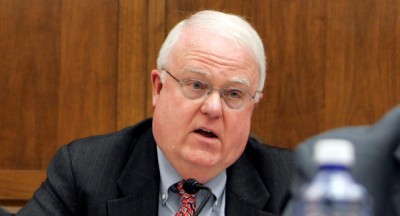The author of the much-maligned Patriot Act thinks the National Security Agency’s surveillance programs are out of control, and he plans on introducing a bill as soon as this week to rein it in.
The bill by Rep. Jim Sesenbrenner (R.-Wisconsin) will end the bulk collection of communications’ records. It has about 60 co-sponsors in the House.
“It ends the NSA’s ability to collect what they call a metadata program,” Sesenbrenner said of his proposed Freedom Act. Metadata refers to the bulk collection of records about communications by the NSA and other agencies. Metadata is what enables the NSA and other agencies to pinpoint individual calls and emails and monitor them.
“This is something that Congress would never have authorized,” Sesenbrenner said of mass surveillance programs. “And since the administration has assumed this authority, Congress should not hesitate to stop it and stop it quickly.”
He believes it has a chance to pass the House. An amendment this year by Rep. Justin Amash (R.-Michigan) targeting the NSA was defeated, 205-217.
A Sensenbrenner spokesman told the National Journal, “Six members who voted no and two who didn’t vote on the Amash amendment are original cosponsors of the USA Freedom Act. Had they voted for the amendment, it would have passed 213 to 211.”
Obama violated Patriot Act, congressman charges
Jim Sensenbrenner wrote the original Patriot Act back in 2001 right after the Sept. 11 terrorist attacks. That law increased the federal government’s power to investigate terrorism.
The Congressman apparently changed his mind about surveillance after Edward Snowden’s exposure of the NSA’s metadata collection efforts. In a Guardian editorial in June, Sensenbrenner made the allegation that the Obama administration’s surveillance efforts actually violate the Patriot Act and abuse the constitution.
“Both the administration and the FISA Court are relying on an unbounded interpretation of the act that Congress never intended,” Sensenbrenner charged. The Congressman claims that the Foreign Intelligence Surveillance (FISA) court is authorizing surveillance activities that are not authorized by the Patriot Act.
What the USA Freedom Act does
Jim Sesenbrenner’s antidote to surveillance abuses is the USA Freedom Act. He laid out the bill’s details in a speech at the Cato Institute, a conservative think tank in Washington.
Basically, the USA Freedom Act amends the Patriot Act and the Foreign Intelligence Surveillance Act (FISA) in an attempt to end metadata collection and other surveillance abuses. Here’s a rundown of what it is supposed to do:
- Amends Section 215 of the Patriot Act to set a new uniform standard for electronic intelligence gathering. Sesenbrenner believes that this will end the collection of metadata.
- Restricts surveillance efforts to “international terrorism investigations” by amending Title 4 of the Foreign Intelligence Surveillance Act.
- Adds additional protections to FISA that are supposed to keep Americans from being targeted.
- Creates a “privacy advocate” who would argue civil liberties concerns before the FISA Court (which meets in secret) and have the ability to appeal FISA rulings to higher courts.
- Requires the government to publicize any FISA decision that constitutes a significant change in the law or policy. “While the targets of terrorist investigations need to remain classified, changes in the law need to be open to debate,” Sesenbrenner said.
- Gives Internet and telecom companies the ability to reveal more information about requests for data about their customers from intelligence and law enforcement agencies. Yahoo, Facebook, Google and Microsoft are all planning to sue the government for this right.
The USA Freedom Act has bipartisan support. In the Senate it’s supported by Patrick Leahy (D.-Vermont) and it is backed by John Conyers (D.-Michigan) in the House. Leahy and Conyers are well-known critics of surveillance.
Leadership opposes Freedom Act
Jim Sesenbrenner believes that he can get the Freedom Act passed but it will face tough opposition in both houses. Sessenbrenner noted that there are congressional leaders that support mass surveillance.
“We are going to have to beat them on the floor, and we are going to do it,” Sesenbrenner predicted.
 Off The Grid News Better Ideas For Off The Grid Living
Off The Grid News Better Ideas For Off The Grid Living





